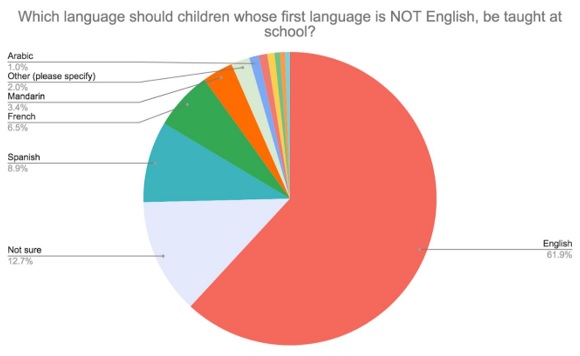Discover the Difference Between Teaching English vs TEFL Teaching: A Comprehensive Guide
18th July 2023

English is a language which has huge demand all over the world. English is considered to be the global language in every possible sector like trade, business, and communication. Because of this, the demand for capable English language teachers has grown exponentially and it’s growing even more as the days pass by.
According to a survey by preply.com, in non-native English-speaking country, majority of the parents wants their children to learn English as a second language.

Source: https://preply.com/en/blog/english-language-statistics/
As the demand for English teachers will grow for sure, those aspiring or experienced teachers have pursued courses like 220 Hours International TEFL Diploma Course, they have a very bright future ahead.
However, there’s a huge misconception that TEFL teaching and Teaching English are the same, it’s actually not. In this blog post, we will get to know the difference between them in detail.
So, without any further delay, let’s get started.
Difference Between Teaching English and TEFL Teaching
While it may seem that teaching English is the same across borders, it is not. Teaching English to native speakers and teaching it as a foreign language requires different approaches. Here are some key differences to consider:
1. Vocabulary and Language Proficiency
One of the major differences between teaching English to a native speaker and a non-native speaker is their vocabulary and English language proficiency level. Generally, native English speakers have a vast vocabulary and have basic proficiency in the English language whereas non-native English speakers have limited vocabulary and struggle with understanding basic and complex grammar rules and structures.
2. Cultural Differences
One of the differences is that native English speakers are generally connected with the culture of the language which they speak.
Whereas, non-native English speaker learners have different cultures and ways of speaking, so for them it may take time to grasp the understanding of the English language.
Hey, do you follow us on Social Media? We regularly share upgraded educational content, tips, feedback and more. Check us out by clicking the profiles here – Facebook / Twitter / LinkedIn / Pinterest / Instagram / YouTube
3. Motivation and Purpose
Native speakers usually learn English to communicate with others in their daily lives. In contrast, foreign language learners may have various reasons for learning English, such as academic purposes, employment opportunities, or personal growth. Understanding learners' motivation and purpose can help teachers create engaging and relevant lessons that meet their student’s needs.
4. Emphasis on Speaking and Listening
TEFL methodology emphasizes speaking and listening because foreign language learners rarely get the opportunity to use English outside the classroom. In contrast, native speakers use English to communicate every day. By creating opportunities for students to speak and listen to English in the classroom, teachers can help improve their students' language proficiency and confidence.
5. Creating Relevance
Another key difference in TEFL methodology is creating relevance. Many foreign language learners may not see the immediate need for learning English, so teachers must create a link between the language being taught and its practical application. For example, teaching business English to students who plan to work in the corporate world can help create relevance and motivation.
6. Adapting to Different Learning Styles
Foreign language learners come from diverse linguistic and cultural backgrounds, which means they have different learning styles and preferences. TEFL methodology emphasizes the importance of adapting teaching techniques to accommodate these different learning styles. This includes using visual aids, hands-on activities, and group work to engage students and improve their understanding.
Teaching English and Teaching English as A Foreign Language is Different
Most people think that teaching English and Teaching English as a Foreign language are the same. However, it is quite the opposite and has many differences which have been mentioned in this blog quite in detail. Those teachers who have pursued courses like 220 Hours International TEFL Diploma Course, know the major differences on how it’s totally different to teach English to a non-native English speaker compare to teaching English to a native speaker.
Find the right course for you and try out the course. Contact us at +6621055721. You can also mail us at asiancollegeofteachers@gmail.com.
Written By : Abhishek